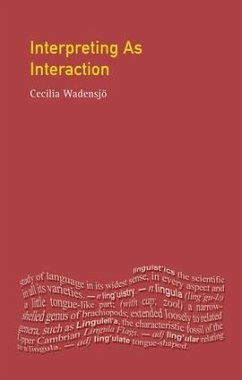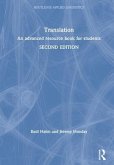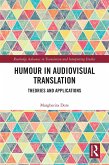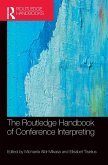Cecilia Wadensjo
Interpreting As Interaction
Cecilia Wadensjo
Interpreting As Interaction
- Gebundenes Buch
- Merkliste
- Auf die Merkliste
- Bewerten Bewerten
- Teilen
- Produkt teilen
- Produkterinnerung
- Produkterinnerung
This text brings attention to a linguistic and social activity which is prominent in modern society but largely unexplored in academic/professional literature. It analyses real-life situations, collected in hospitals and at police stations, and applies a Bakhtinian dialogic theory of language and mind. The data shows that the interpreter's prescribed role as a non-participating, non-person does not - and cannot - always hold true. The book offers an alternative understanding of the interpreter's task, as consisting of translating and coordinating, and of the interpreter as an actor solving problems of translatability in situated, social interaction.…mehr
Andere Kunden interessierten sich auch für
![English in Southeast Asia and ASEAN English in Southeast Asia and ASEAN]() Azirah HashimEnglish in Southeast Asia and ASEAN195,99 €
Azirah HashimEnglish in Southeast Asia and ASEAN195,99 €![Consecutive Interpreting Consecutive Interpreting]() Andrew GilliesConsecutive Interpreting195,99 €
Andrew GilliesConsecutive Interpreting195,99 €![Translation Translation]() Basil HatimTranslation196,99 €
Basil HatimTranslation196,99 €![Humour in Audiovisual Translation Humour in Audiovisual Translation]() Margherita DoreHumour in Audiovisual Translation196,99 €
Margherita DoreHumour in Audiovisual Translation196,99 €![Language and Migration Language and Migration]() Tony CapstickLanguage and Migration196,99 €
Tony CapstickLanguage and Migration196,99 €![The Routledge Handbook of Conference Interpreting The Routledge Handbook of Conference Interpreting]() The Routledge Handbook of Conference Interpreting303,99 €
The Routledge Handbook of Conference Interpreting303,99 €![Second Language Acquisition Second Language Acquisition]() Susan M. GassSecond Language Acquisition193,99 €
Susan M. GassSecond Language Acquisition193,99 €-
-
-
This text brings attention to a linguistic and social activity which is prominent in modern society but largely unexplored in academic/professional literature. It analyses real-life situations, collected in hospitals and at police stations, and applies a Bakhtinian dialogic theory of language and mind. The data shows that the interpreter's prescribed role as a non-participating, non-person does not - and cannot - always hold true. The book offers an alternative understanding of the interpreter's task, as consisting of translating and coordinating, and of the interpreter as an actor solving problems of translatability in situated, social interaction.
Hinweis: Dieser Artikel kann nur an eine deutsche Lieferadresse ausgeliefert werden.
Hinweis: Dieser Artikel kann nur an eine deutsche Lieferadresse ausgeliefert werden.
Produktdetails
- Produktdetails
- Verlag: Routledge
- Seitenzahl: 336
- Erscheinungstermin: 15. April 2016
- Englisch
- Abmessung: 222mm x 145mm x 22mm
- Gewicht: 555g
- ISBN-13: 9781138141315
- ISBN-10: 1138141313
- Artikelnr.: 69947674
- Herstellerkennzeichnung
- Libri GmbH
- Europaallee 1
- 36244 Bad Hersfeld
- gpsr@libri.de
- Verlag: Routledge
- Seitenzahl: 336
- Erscheinungstermin: 15. April 2016
- Englisch
- Abmessung: 222mm x 145mm x 22mm
- Gewicht: 555g
- ISBN-13: 9781138141315
- ISBN-10: 1138141313
- Artikelnr.: 69947674
- Herstellerkennzeichnung
- Libri GmbH
- Europaallee 1
- 36244 Bad Hersfeld
- gpsr@libri.de
Cecilia Wadensjo
General Editor's Preface
Acknowledgements
I. Just an ordinary hearing
1. The themes of this book
2. How this book is organised
II. Talk as text and talk as activity
1. Opposing and interdependent views
2. Translation studies - an inter-discipline
3. In searh for a theory of sense making
4. Monologism, dialogism and studies on interpreting
III. Community interpreting: Going professional
1. Defining community interpreting
2. Education and certification
IV. Interpreters and other intermediaries
1. It takes three to make an intermediary
2. Interpreters in face-to-face interaction
V. Discourse studies - on method and analytical framework
1. Social role - normative, typical and personal standards
2. Collecting data - recording and transcribing
VI. Ideal interpreting in actual performance
1. Textual structures in interpreter-mediated talk
2. "And can you show where?"
3. "She coughs in this way (.) and it is a dry cough"
4. "Just a second"
5. Translating and coordinating - two activities in one
VII. In a communicative pas de trois
1. Exploring interpreter-mediated interaction order
2. "I have to retrain myself"
3. "Say what he says now"
4. "It'll all be hunky-dory"
5. "About four years ago?"
6. Conclusion - challenges and counter measures
VIII. Communication and Miscommunication
1. Problematising 'understanding'
2. "We misunderstood each other..."
3. "Have been divorced"
4. "Me or us?"
5. "You mentioned parasites"
6. "How is this looked upon?"
7. Resource for communication and source of miscommunication
IX. When I say what you mean
1. Problematising 'neutrality'
2. "She says: no, I'm referring to cars"
3. "And they say that..."
4. "Can you ask him to comment"
5. "She goes: yes"
6. "What is this? They say: it's okay"
7. "Would you allow me to add"
8. The analysing aspect of reported speech
X. Bridging gaps and sustaining differences
1. Translating in interpreting - in a dialogical frame
2. Interpreters and professionalism
Bibliography
Index
Acknowledgements
I. Just an ordinary hearing
1. The themes of this book
2. How this book is organised
II. Talk as text and talk as activity
1. Opposing and interdependent views
2. Translation studies - an inter-discipline
3. In searh for a theory of sense making
4. Monologism, dialogism and studies on interpreting
III. Community interpreting: Going professional
1. Defining community interpreting
2. Education and certification
IV. Interpreters and other intermediaries
1. It takes three to make an intermediary
2. Interpreters in face-to-face interaction
V. Discourse studies - on method and analytical framework
1. Social role - normative, typical and personal standards
2. Collecting data - recording and transcribing
VI. Ideal interpreting in actual performance
1. Textual structures in interpreter-mediated talk
2. "And can you show where?"
3. "She coughs in this way (.) and it is a dry cough"
4. "Just a second"
5. Translating and coordinating - two activities in one
VII. In a communicative pas de trois
1. Exploring interpreter-mediated interaction order
2. "I have to retrain myself"
3. "Say what he says now"
4. "It'll all be hunky-dory"
5. "About four years ago?"
6. Conclusion - challenges and counter measures
VIII. Communication and Miscommunication
1. Problematising 'understanding'
2. "We misunderstood each other..."
3. "Have been divorced"
4. "Me or us?"
5. "You mentioned parasites"
6. "How is this looked upon?"
7. Resource for communication and source of miscommunication
IX. When I say what you mean
1. Problematising 'neutrality'
2. "She says: no, I'm referring to cars"
3. "And they say that..."
4. "Can you ask him to comment"
5. "She goes: yes"
6. "What is this? They say: it's okay"
7. "Would you allow me to add"
8. The analysing aspect of reported speech
X. Bridging gaps and sustaining differences
1. Translating in interpreting - in a dialogical frame
2. Interpreters and professionalism
Bibliography
Index
General Editor's Preface
Acknowledgements
I. Just an ordinary hearing
1. The themes of this book
2. How this book is organised
II. Talk as text and talk as activity
1. Opposing and interdependent views
2. Translation studies - an inter-discipline
3. In searh for a theory of sense making
4. Monologism, dialogism and studies on interpreting
III. Community interpreting: Going professional
1. Defining community interpreting
2. Education and certification
IV. Interpreters and other intermediaries
1. It takes three to make an intermediary
2. Interpreters in face-to-face interaction
V. Discourse studies - on method and analytical framework
1. Social role - normative, typical and personal standards
2. Collecting data - recording and transcribing
VI. Ideal interpreting in actual performance
1. Textual structures in interpreter-mediated talk
2. "And can you show where?"
3. "She coughs in this way (.) and it is a dry cough"
4. "Just a second"
5. Translating and coordinating - two activities in one
VII. In a communicative pas de trois
1. Exploring interpreter-mediated interaction order
2. "I have to retrain myself"
3. "Say what he says now"
4. "It'll all be hunky-dory"
5. "About four years ago?"
6. Conclusion - challenges and counter measures
VIII. Communication and Miscommunication
1. Problematising 'understanding'
2. "We misunderstood each other..."
3. "Have been divorced"
4. "Me or us?"
5. "You mentioned parasites"
6. "How is this looked upon?"
7. Resource for communication and source of miscommunication
IX. When I say what you mean
1. Problematising 'neutrality'
2. "She says: no, I'm referring to cars"
3. "And they say that..."
4. "Can you ask him to comment"
5. "She goes: yes"
6. "What is this? They say: it's okay"
7. "Would you allow me to add"
8. The analysing aspect of reported speech
X. Bridging gaps and sustaining differences
1. Translating in interpreting - in a dialogical frame
2. Interpreters and professionalism
Bibliography
Index
Acknowledgements
I. Just an ordinary hearing
1. The themes of this book
2. How this book is organised
II. Talk as text and talk as activity
1. Opposing and interdependent views
2. Translation studies - an inter-discipline
3. In searh for a theory of sense making
4. Monologism, dialogism and studies on interpreting
III. Community interpreting: Going professional
1. Defining community interpreting
2. Education and certification
IV. Interpreters and other intermediaries
1. It takes three to make an intermediary
2. Interpreters in face-to-face interaction
V. Discourse studies - on method and analytical framework
1. Social role - normative, typical and personal standards
2. Collecting data - recording and transcribing
VI. Ideal interpreting in actual performance
1. Textual structures in interpreter-mediated talk
2. "And can you show where?"
3. "She coughs in this way (.) and it is a dry cough"
4. "Just a second"
5. Translating and coordinating - two activities in one
VII. In a communicative pas de trois
1. Exploring interpreter-mediated interaction order
2. "I have to retrain myself"
3. "Say what he says now"
4. "It'll all be hunky-dory"
5. "About four years ago?"
6. Conclusion - challenges and counter measures
VIII. Communication and Miscommunication
1. Problematising 'understanding'
2. "We misunderstood each other..."
3. "Have been divorced"
4. "Me or us?"
5. "You mentioned parasites"
6. "How is this looked upon?"
7. Resource for communication and source of miscommunication
IX. When I say what you mean
1. Problematising 'neutrality'
2. "She says: no, I'm referring to cars"
3. "And they say that..."
4. "Can you ask him to comment"
5. "She goes: yes"
6. "What is this? They say: it's okay"
7. "Would you allow me to add"
8. The analysing aspect of reported speech
X. Bridging gaps and sustaining differences
1. Translating in interpreting - in a dialogical frame
2. Interpreters and professionalism
Bibliography
Index
General Editor's Preface
Acknowledgements
I. Just an ordinary hearing
1. The themes of this book
2. How this book is organised
II. Talk as text and talk as activity
1. Opposing and interdependent views
2. Translation studies - an inter-discipline
3. In searh for a theory of sense making
4. Monologism, dialogism and studies on interpreting
III. Community interpreting: Going professional
1. Defining community interpreting
2. Education and certification
IV. Interpreters and other intermediaries
1. It takes three to make an intermediary
2. Interpreters in face-to-face interaction
V. Discourse studies - on method and analytical framework
1. Social role - normative, typical and personal standards
2. Collecting data - recording and transcribing
VI. Ideal interpreting in actual performance
1. Textual structures in interpreter-mediated talk
2. "And can you show where?"
3. "She coughs in this way (.) and it is a dry cough"
4. "Just a second"
5. Translating and coordinating - two activities in one
VII. In a communicative pas de trois
1. Exploring interpreter-mediated interaction order
2. "I have to retrain myself"
3. "Say what he says now"
4. "It'll all be hunky-dory"
5. "About four years ago?"
6. Conclusion - challenges and counter measures
VIII. Communication and Miscommunication
1. Problematising 'understanding'
2. "We misunderstood each other..."
3. "Have been divorced"
4. "Me or us?"
5. "You mentioned parasites"
6. "How is this looked upon?"
7. Resource for communication and source of miscommunication
IX. When I say what you mean
1. Problematising 'neutrality'
2. "She says: no, I'm referring to cars"
3. "And they say that..."
4. "Can you ask him to comment"
5. "She goes: yes"
6. "What is this? They say: it's okay"
7. "Would you allow me to add"
8. The analysing aspect of reported speech
X. Bridging gaps and sustaining differences
1. Translating in interpreting - in a dialogical frame
2. Interpreters and professionalism
Bibliography
Index
Acknowledgements
I. Just an ordinary hearing
1. The themes of this book
2. How this book is organised
II. Talk as text and talk as activity
1. Opposing and interdependent views
2. Translation studies - an inter-discipline
3. In searh for a theory of sense making
4. Monologism, dialogism and studies on interpreting
III. Community interpreting: Going professional
1. Defining community interpreting
2. Education and certification
IV. Interpreters and other intermediaries
1. It takes three to make an intermediary
2. Interpreters in face-to-face interaction
V. Discourse studies - on method and analytical framework
1. Social role - normative, typical and personal standards
2. Collecting data - recording and transcribing
VI. Ideal interpreting in actual performance
1. Textual structures in interpreter-mediated talk
2. "And can you show where?"
3. "She coughs in this way (.) and it is a dry cough"
4. "Just a second"
5. Translating and coordinating - two activities in one
VII. In a communicative pas de trois
1. Exploring interpreter-mediated interaction order
2. "I have to retrain myself"
3. "Say what he says now"
4. "It'll all be hunky-dory"
5. "About four years ago?"
6. Conclusion - challenges and counter measures
VIII. Communication and Miscommunication
1. Problematising 'understanding'
2. "We misunderstood each other..."
3. "Have been divorced"
4. "Me or us?"
5. "You mentioned parasites"
6. "How is this looked upon?"
7. Resource for communication and source of miscommunication
IX. When I say what you mean
1. Problematising 'neutrality'
2. "She says: no, I'm referring to cars"
3. "And they say that..."
4. "Can you ask him to comment"
5. "She goes: yes"
6. "What is this? They say: it's okay"
7. "Would you allow me to add"
8. The analysing aspect of reported speech
X. Bridging gaps and sustaining differences
1. Translating in interpreting - in a dialogical frame
2. Interpreters and professionalism
Bibliography
Index
General Editor's Preface
Acknowledgements
I. Just an ordinary hearing
1. The themes of this book
2. How this book is organised
II. Talk as text and talk as activity
1. Opposing and interdependent views
2. Translation studies - an inter-discipline
3. In searh for a theory of sense making
4. Monologism, dialogism and studies on interpreting
III. Community interpreting: Going professional
1. Defining community interpreting
2. Education and certification
IV. Interpreters and other intermediaries
1. It takes three to make an intermediary
2. Interpreters in face-to-face interaction
V. Discourse studies - on method and analytical framework
1. Social role - normative, typical and personal standards
2. Collecting data - recording and transcribing
VI. Ideal interpreting in actual performance
1. Textual structures in interpreter-mediated talk
2. "And can you show where?"
3. "She coughs in this way (.) and it is a dry cough"
4. "Just a second"
5. Translating and coordinating - two activities in one
VII. In a communicative pas de trois
1. Exploring interpreter-mediated interaction order
2. "I have to retrain myself"
3. "Say what he says now"
4. "It'll all be hunky-dory"
5. "About four years ago?"
6. Conclusion - challenges and counter measures
VIII. Communication and Miscommunication
1. Problematising 'understanding'
2. "We misunderstood each other..."
3. "Have been divorced"
4. "Me or us?"
5. "You mentioned parasites"
6. "How is this looked upon?"
7. Resource for communication and source of miscommunication
IX. When I say what you mean
1. Problematising 'neutrality'
2. "She says: no, I'm referring to cars"
3. "And they say that..."
4. "Can you ask him to comment"
5. "She goes: yes"
6. "What is this? They say: it's okay"
7. "Would you allow me to add"
8. The analysing aspect of reported speech
X. Bridging gaps and sustaining differences
1. Translating in interpreting - in a dialogical frame
2. Interpreters and professionalism
Bibliography
Index
Acknowledgements
I. Just an ordinary hearing
1. The themes of this book
2. How this book is organised
II. Talk as text and talk as activity
1. Opposing and interdependent views
2. Translation studies - an inter-discipline
3. In searh for a theory of sense making
4. Monologism, dialogism and studies on interpreting
III. Community interpreting: Going professional
1. Defining community interpreting
2. Education and certification
IV. Interpreters and other intermediaries
1. It takes three to make an intermediary
2. Interpreters in face-to-face interaction
V. Discourse studies - on method and analytical framework
1. Social role - normative, typical and personal standards
2. Collecting data - recording and transcribing
VI. Ideal interpreting in actual performance
1. Textual structures in interpreter-mediated talk
2. "And can you show where?"
3. "She coughs in this way (.) and it is a dry cough"
4. "Just a second"
5. Translating and coordinating - two activities in one
VII. In a communicative pas de trois
1. Exploring interpreter-mediated interaction order
2. "I have to retrain myself"
3. "Say what he says now"
4. "It'll all be hunky-dory"
5. "About four years ago?"
6. Conclusion - challenges and counter measures
VIII. Communication and Miscommunication
1. Problematising 'understanding'
2. "We misunderstood each other..."
3. "Have been divorced"
4. "Me or us?"
5. "You mentioned parasites"
6. "How is this looked upon?"
7. Resource for communication and source of miscommunication
IX. When I say what you mean
1. Problematising 'neutrality'
2. "She says: no, I'm referring to cars"
3. "And they say that..."
4. "Can you ask him to comment"
5. "She goes: yes"
6. "What is this? They say: it's okay"
7. "Would you allow me to add"
8. The analysing aspect of reported speech
X. Bridging gaps and sustaining differences
1. Translating in interpreting - in a dialogical frame
2. Interpreters and professionalism
Bibliography
Index








